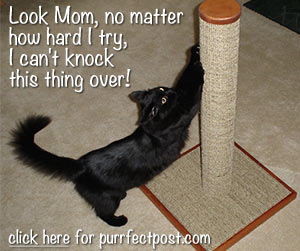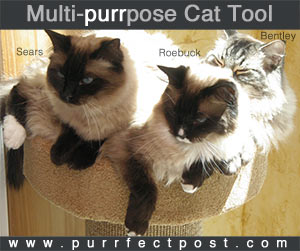Abyssinian Cats: An Interview with Fancy Cat

Our feline mascot, Fancy, has been busy interviewing members of "The 10 Most Popular Cat Breeds." Today, she sat down (and then ran around) with Aby the Abyssinian to learn more about that breed's characteristics.
Fancy: Hi Aby, I'm ready for you! Aby? Aby, can you please come over and sit still for your interview? It will only take a few minutes.
Aby: Oh sorry, Fancy! It's hard for me to sit still when there are new things to explore. I'm just so curious about everything; I can't seem to focus when interesting things are going on. Is that a crumpled up piece of paper over there? Would you like to chase it with me?
Fancy: I'd love to, but let's get the work part out of the way first, if you don't mind. That way we can really relax and play. So you're an Abyssinian: can you tell me about the history of your breed?
Aby: Well, my breed is very old, so its exact origins have been lost, but the most widely-held belief is that the Abyssinian is directly descended from the sacred cats of ancient Egypt. From there, they were taken to Abyssinia and then brought to England after a brief war. Another hypothesis is that Abyssinians were created by the repeated breeding together of British shorthair cats that had ticked hair coats (2-3 bands of darker coloring are present on each hair, with the darkest color nearest the tip). The truth of our history probably falls somewhere in between those two ideas: some ticked cats from Abyssinia could easily have been brought back to England and bred with the early British shorthair cats.
Fancy: Aby, you're very lovely. Can you describe for our readers the typical features displayed by a member of your breed?
Aby: Oh sure. We have short hair, large ears, long tails that are thick at the base and taper down to the end, and we're lean and muscular. We have wedge-shaped heads with large ears and slender legs with small feet. The most common colors we come in are a warm brown called ruddy, red, and blue, and we all have that ticking I told you about earlier. We're medium-sized cats that are usually between six and ten pounds. The Somali breed is a long-haired version of the Abyssinian.
Fancy: I can tell from our brief visit so far that you're highly intelligent, very friendly, and you love to explore. Are there any other personality traits that are common among Abyssinians?
Aby: We have high energy levels, and we love to be part of our humans' lives. In fact, some people might find us a little attention-demanding. We can be a bit wary of strangers sometimes.
Fancy: Are there any special health problems that are common in your breed?
Aby: We have a higher incidence of a certain illness called pyruvate kinase deficiency, which is a hereditary condition that causes a decreased ability for cells to metabolize sugar for energy. This can result in anemia. Sometimes other common causes of anemia in cats are diagnosed instead of pyruvate kinase deficiency, resulting in improper treatment, so it's important for our humans to know about this condition.
Fancy: All cats need to have certain routine care like tooth-brushing done, but is there anything more that's required for Abyssinian cats?
Aby: No, not really. Just brush an Abyssinian every week to keep the hair coat looking and feeling good.
Fancy: What about household considerations? Is there anything special in the home that an Abyssinian requires?
Aby: Well, since Abyssinians love to explore, especially high places, our humans will need to provide safe areas for us to do that and also protect their household items. Museum wax works well to help secure items on shelves. Cat perches placed in front of windows provide entertainment and a great place to relax.
Cardboard box mazes and paper bags with the handles removed are easy toys to provide variety. Once explored, they can be put away and reconfigured later in another room. Rotating and hiding toys in different areas for us to find is also awesomely fun.
Humans should probably secure any cabinets that contain toxic items because we are quite adept at opening doors in order to explore new territory.
Fancy: It sounds to me like Abyssinians need a lot of attention from their humans.

Aby: Yes, we are not cats to be ignored. We need stimulation and interaction to thrive. People should not get an Abyssinian if they just want a pretty furry friend to cuddle and adore. Most of us aren't much for lap-sitting. But due to our highly intelligent and inquisitive behavior, we can often be trained to do tricks, walk on a leash, and even train our humans to play with us. People should consider getting an Aby if they want a buddy with whom they can have a mutually interactive relationship. We want a person who will appreciate our intelligence and prowess. Although, like all cats, we will also expect to be adored.
Fancy: Thanks for the interview, Aby; it sounds like members of your breed are a lot of fun to be around. Are you ready to do some exploring?
Aby: Oh yes! I want to check out that cupboard over there, climb up on that tall shelf, and poke around in those dark corners. Wanna' come?
You May Also Like These Articles:
Quiz - Inappropriate Urination in Cats
Devon Rex Cats: An Interview with Fancy Cat
Persian Cats: An Interview with Fancy Cat
Top 10 Most Popular Cat Breeds - Slideshow
Siamese Cats: An Interview with Fancy Cat
Notice: Ask-a-Vet is an affiliated service for those who wish to speak with a veterinary professional about their pet's specific condition. Initially, a bot will ask questions to determine the general nature of your concern. Then, you will be transferred to a human. There is a charge for the service if you choose to connect to a veterinarian. Ask-a-Vet is not manned by the staff or owners of CatHealth.com, and the advice given should not delay or replace a visit to your veterinarian.






